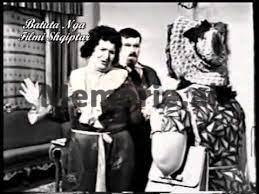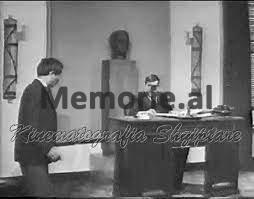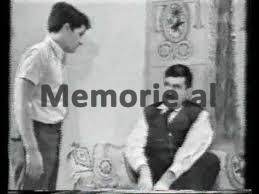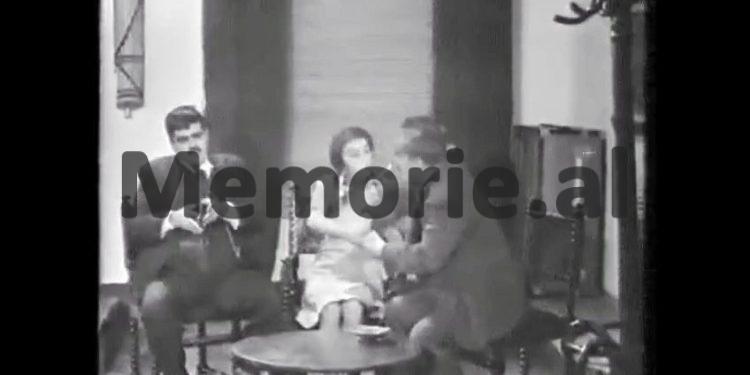By Ilir Bushi
Memorie.al / “Gentlemen, you have speculated enough with my name, trying unfairly to compare today’s bribers and thieves with Selman Kukalesh, so from now on, find another symbol, because my father lived and died with honor”. This is how Hysen Kukaleshi, the son of the former police commissioner of the capital, during the years of the Second World War, expressed his revolt and anxiety gathered for years. He also adds: “Mon Kukaleshi, he has left from Albania, in October 1944, leaving no wealth or gold for our family”. As a result of the disappointments from today’s deputies, Hyseni also clarifies his position regarding the parliamentary elections: “Until now, I have voted systematically for the Right, hoping for the establishment of a democratic system, but in the next elections, I intend to abstain”.
Mr. Hysen, how do you remember your father, Selman Kukalesh, during the War years?
My father, Selman Kukaleshi, fled Albania in October 1944, when I was eight years old. The exact date of the escape is not known by anyone. Some even say he left in September. Being young, I don’t remember much because he was always busy with work.
At tironci, we respect the work and always devote the right time to it. However, I remember that when he came home, he was very affectionate with me and my sister. He also respected his mother a lot, that’s why all those who knew him say that; “Mon Kukaleshi was a family man”.
What kind of education did your father, Selmani, have when he was serving as the police commissioner of Tirana?
Father had high school. Before being appointed as the director of the capital’s Police, the father did various jobs to support the family. For some time he worked as a real estate agent, but he did not earn much. While the mother was a housewife.
What connections did Mon Kukaleshi have with the then prefect of Tirana, Qazim Mullet?
There was a work connection. Both were the main officials for the smooth running of affairs in Tirana. According to the protocol, the Police Station depended on the Prefecture. Of course, because of their duties, they had also formed close friendships with each other.
In addition to work, did drinking or gambling connect the two leaders?
No. Mon Kukaleshi, never played gambling. Neither poker nor gambling. Also, no one remembers ever drinking to excess. But Qazim Mulleti was also a family man and without vices.
What was Mon Kukaleshi’s relationship with the prisoners of Tirana?
My father had a principle: Every month, if one less person is imprisoned, then society has reflected one more step towards emancipation and respect for civil rules. He tried to help the poor, by forgiving their punishments, or by softening them. In our house, every day, the pilgrims came, whom my father helped.
Did those who came bring fish to solve the problem?
Absolutely not. The father did not accept a single penny. Most of those who came were old and worn out women, for whom I felt sorry. But on the other hand, he had it in his human principle, that; “Whoever takes from the ration of the fuqarai commits a sin against God”. The rumors that have been spread about him are all lies. I want these rumors to end once and for all.
I base what I say on the fact that; after the war, no citizen of Tirana said half a word to me about my father. If he had taken bribes, someone would come and tell me after the war, when our family was persecuted by the communists. But it happened that, although the communist state called us; “enemies”, the common people loved us and they continued to remember my father with respect.
But Besim Levonja wrote in his comedy “The Prefect”, that Qazim Mulleti used Mon Kukaleshi as a bribe collector?
They are thick lies, since then rose to art by power politics. I’m just telling you one thing. In a part of the comedy, Qazim Mulleti says to those who give him bribes: “Give Mon Kukalesh, because he has a pot of ink”. Look what nonsense. Then all of Tirana knew that Mon Kukaleshi had only one son and one daughter. Only Besim Levonja pretended not to know, and said; “a hearth of reeds”.
Where did Mon Kukaleshi live after 1944?
He first went to Reggio Emilia in Italy. Then he traveled to Egypt. Later he went to Syria and finally to Lebanon. All this time, we have not had any contact with the father. The state took our house at Pazari Ri. While in 1983, we received the news that my father had breathed his last in Lebanon. But neither then nor now, did we not find out the location of his grave!
Currently, we don’t even have money to fix the house, which is falling apart day by day. I live with my wife, because the two children (boy and girl, I am married) only with pensions. If we had had any money from our father, we would still not heat with a wood stove, but we would buy at least a gas or electric stove.
But the name of Mon Kukaleshi has been mentioned by the deputies as a kind of generalization for the corrupt people of today’s government?
This has caused me great sadness and revolt. Mon Kukaleshi has never stolen, but for 50 years, the public was fed a comedic tale. Then we had nothing to do, because it was a dictatorship. After the 90s, we finally said; “Thank goodness that democracy came, where values are called by their true name.” I have suffered for 50 years, working at various jobs, to provide bread. My wife, has also been described as; “enemy’s son’s bride”.
But, after ’90, we remembered that we escaped from this misunderstanding. For some time, we nurtured the illusion that the new system would eradicate the old madness. However, I was extremely sad when I suddenly heard on television one day, the deputy of the Democratic Party, Vili Minarolli, who mentioned the name of Mon Kukaleshi. He wanted to describe some socialist officials as corrupt and said; “Young Mon Kukalesh”.
What did you do when you heard Minarolli’s sentence?
I got dressed and immediately went to his office. I was very stressed. He didn’t recognize me, but he invited me inside. I immediately asked him, what right did he have to generalize today’s thieves, under the name of Mon Kukaleshi?! He understood and retreated. He only told me that; everything was left as an expression, from the comedy “The Prefect”.
I clarified and he promised me that he would not repeat that mistake again. When I left, I didn’t even shake his hand. On this occasion, I have prepared a letter for the senior political leaders, where I request that; put an end to the speculation with my father. I am proud of Selman Kukalesh because, he has never accepted as a bribe, not even a grain of egg, and no longer asked Napoleon for gold.
Which candidate will you vote for in the upcoming parliamentary or local government elections?
I have systematically voted for the right, but this time I have decided to abstain. During these years, the evolution of politics has been very disappointing and slow, lagging far behind the pace and demands of the people.
Hysen Kukaleshi: “This is how my father spent the 83 years of his life”
“My father, Selman Kukaleshi, was born in the city of Tirana at the turn of the 20th century, exactly in 1900. When he turned 14 (1914), he completed the seven-year school of the capital, while in 1919, he completed secondary studies in Tirana gymnasium”. This is how Hyseni, or Ceni (as his friends and relatives know him), the son of the former chief of Tirana Police, Selman Kukaleshi, expressed himself. He said that after graduating from this school, Selman Kukaleshi was engaged in various jobs in the capital, while for two years, he worked privately as a realtor for buying and selling houses.
According to his contemporaries, his character stood out for his passion for the correct implementation of his duties, therefore, during the Second World War, he was appointed chief of the Tirana Police. It was precisely the period when in the office of prefect of Tirana, there was a fellow citizen and close friend of his, whose name was Qazim Mulleti. Selman Kukaleshi got married at the age of 30, with his wife, whose name was Zoje.
From this marriage, he gave birth to two children, Hysen, (July 18, 1936) and his eldest daughter, Iqbal, (1931). While his departure from Albania took place at the end of October, 1944. A few days before Enver Hoxha’s partisans came down from the mountains and took power. The countries where he stayed during the second half of the 20th century were Italy, Egypt, Syria and Lebanon. It is said that Selman Kukaleshi died in 1983, in Lebanon. Memorie.al














